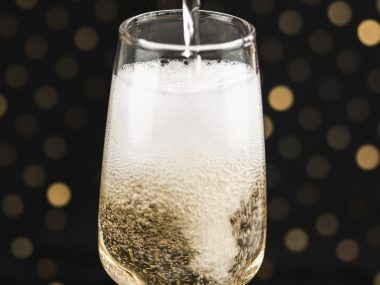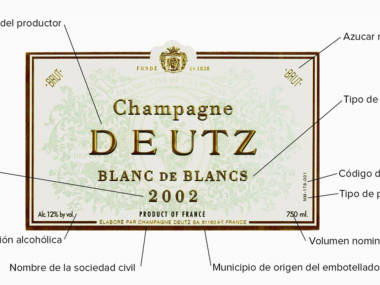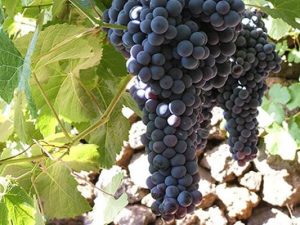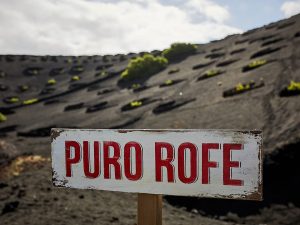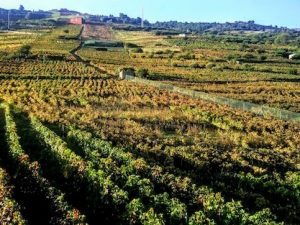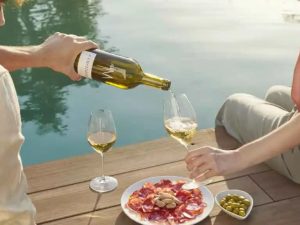For Marcos Eguren, oenologist and owner with his brother Miguel, Viñedos y Bodegas Sierra Cantabria. With more than 150 years of history, this winery has maintained the same philosophy for more than four generations. “It is respect for the land, for the environment and the identity of the wine that is born from each vineyard”, summarises Marcos Eguren, adding that for him, “Wine is emotion, it is the expression of a landscape, of a job, of a people, it is a compendium of culture and enjoyment”. In this interview with Gourmet Hunters, he tells us everything about how his wines are made, how a great wine is obtained, and how he chooses which wine to drink at each moment.
How would you describe the philosophy that has sustained your family for four generations?
Our family is a family of wine growers and winemakers who have always had the same philosophy. It is the respect for the land, the environment and the identity of the wine that is born from each vineyard. And, of course, also the idea of achieving a product as healthy as possible. For this, an exhaustive and careful work of the vineyard is carried out without using any product, neither chemical preservatives, nor minerals, nor products of synthesis. This is an exquisite care to achieve the best identity of each vineyard, both in the vineyard and in the winery.
Hence the importance they give to traditional viticulture…
We have always believed that wine is great if the vineyard is large. And wine is made and should be made in the vineyard. The quality of a product is always based on four factors: its soil, the climate, the variety and the work done in the vineyard. When these four factors are in full complicity is when the great wine is born. Always without manipulating the environment, because logically within what is the work we can interfere with irrigation, with mineral fertilizers, with chemical preservatives, with products of synthesis, etc. We have always run away from them. For our family, making wine from the vineyard means always working hand in hand with nature. That is to say, to make a manual tilling without modifying the structure of the soil with a contribution of organic matter, of manure, always from the environment, but very controlled. We make sure that this manure is composted for 2 or 3 years, because we are going to provide a microbiological load that will be the sustenance for that land to have a spectacular microfauna, of worms, insects, microorganisms and a microflora with herbs from the environment itself. This will give life to the soil, will give life to the plant and of course will give life, energy and purity to the wine.
It also means much more work
Yes. It’s a job with much more dedication, that’s for sure. Because we have to be continually in the vineyard, or doing manual work, removing the weeds that are not good by hand. There are also times when we have to drive the vegetation, because there are colder years and warmer years. There are years when we need more leaf area, so we will have to take care that the plant develops with purity and strength. There are other years that maybe we need the vegetation to be limited, because there is a lot of evapotranspiration. There are very rainy years, so we will have to limit the production a little as well. There are infinite factors that make us continuously interrelated with the vineyard.
"Our family has always had the same philosophy. It is the respect for the land, the environment and the identity of the wine that is born from each vineyard"
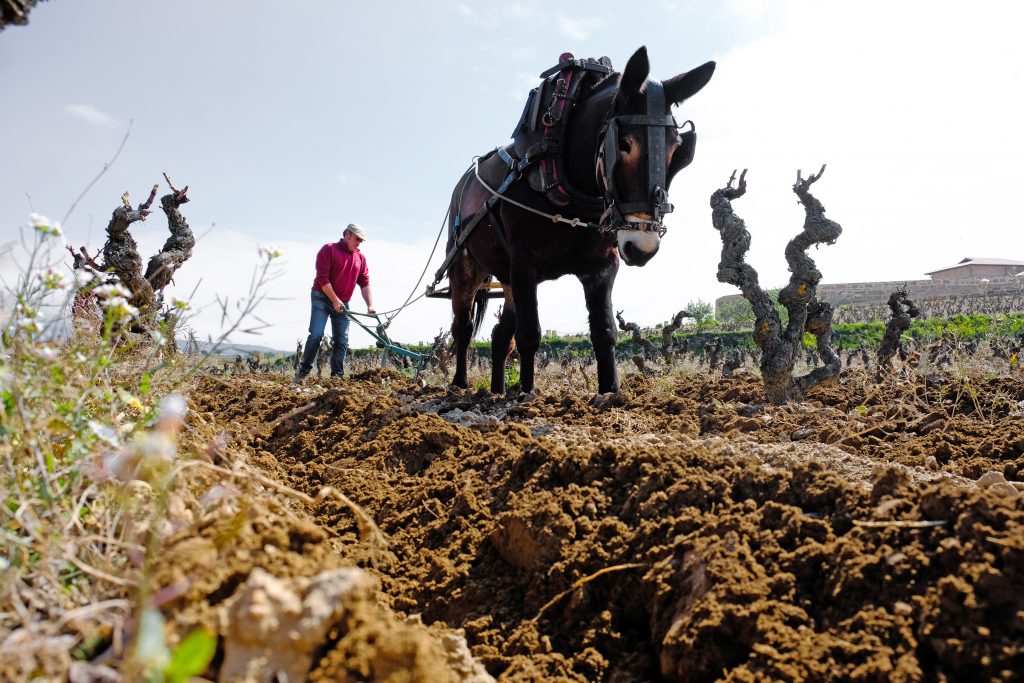
You’ve always maintained the same philosophy, but what new things have you had to incorporate over time?
We worked like our great-grandfather did, but with a difference, because today we have means and knowledge that they did not have. For example, my great-grandfather used manure, but he used an undetermined amount and depending on what he could conceive each year. Today we cannot afford them. We have to work with the soil with very high precision, then we have to analyze it, see how the micro and macro components are, how biological life is in the soil, and provide the necessary organic matter. We know that it can be 200 kilos per hectare of an organic compound that has already been composted for quite some time, that there is no contribution of nitrogen, that there is no contribution of other things, but of life, of organic matter. There are other years in which perhaps this must be completed with iron, calcium, and for this in the organic matter we compost plants from the environment, which will provide us with some calcium bicarbonate, a little of these micro and macro elements to always seek a balance. I believe that great wine is always shown by its balance.
The fact that they do not intervene in the soil does not mean that they do not have it well studied
Of course. What we don’t do is modify it. If we know that the balance and life of that vineyard has one gram of organic matter, if we wanted to produce a little more we could raise it to 2 and a half grams. It would be natural composting, but we would be rotating the soil. If the environment is inferior we know that there will be a deterioration in quality because the plant will not have the micro and macro elements to develop in balance, neither in excess nor in defect.
What characteristics does the fact that your wines are made at the foot of the Sonsierra mountain range give them?
San Vicente de la Sonsierra is a small village located in La Rioja, in the north of Spain. Why is the vine an ancient crop in our village? For several reasons. Firstly, because it is a very poor land that comes from the degradation of the Sierra Cantabria, it is a soil with very poor characteristics, which makes it very difficult for other crops that need very rich land to develop. Second, it is a land that can hardly be irrigated, because it is upstream of the river Ebro, so we have to limit ourselves to the natural rainfall of the environment. Although irrigation is now being carried out in the area to be able to water the vineyard, we are, in principle, running away from this. Thirdly, we are limited to the north by the Sierra Cantabria, right on the slopes of this mountain range. The Sierra Cantabria protects us from the cold winds and rains of the Cantabrian Sea. As an example, at the top of the sierra, the northern part facing the Cantabrian Sea, it can rain as much as 1,100/1,200 litres per m2 per year. And in the southern part of the sierra, which is ours, between 450 and 500. At 300 metres there is a difference in rainfall of more than double. So the sierra protects us from the rain and cold winds from the north. Because of our altitude and latitude we are a limit zone of cultivation. Therefore, we need a south-south-east exposure so that the grapes reach their perfect ripening balance.
"I believe that great wine is always shown by its balance"
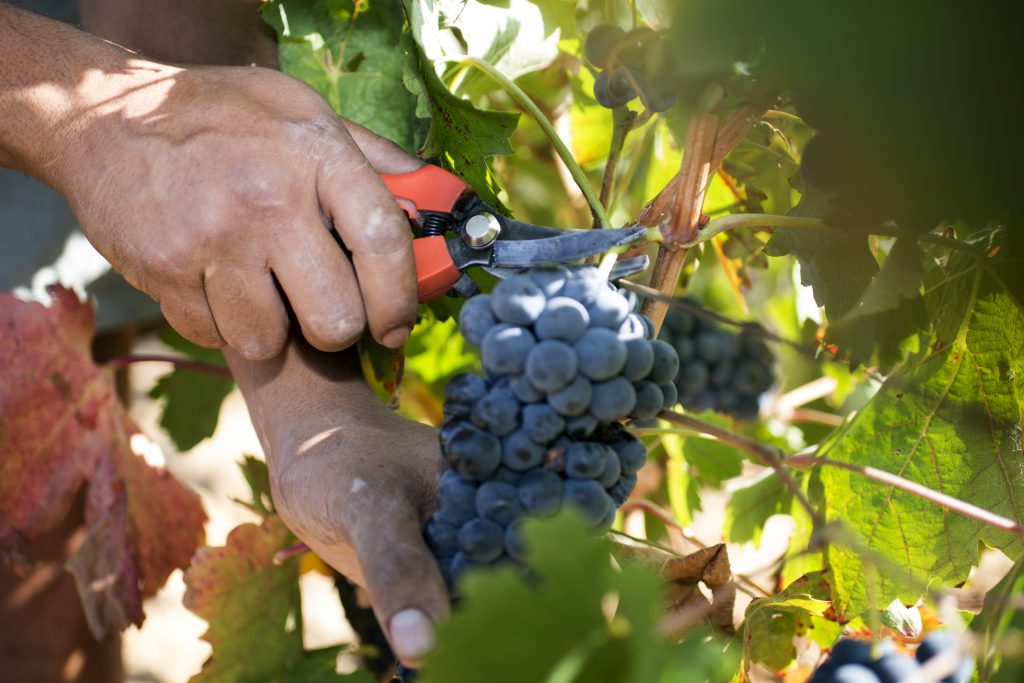
Why are your wines so emblematic?
I believe that our family and our wines have stood out many times for their uniqueness. Normally, in a large part of the world, wines are blended wines, that is, the winery decides how it wants its wine to be and brings in different varieties of grapes from different areas depending on the year, makes a blend, and then the structure of the wine is given by the winery. In our case, it is a much purer and different philosophy. In other words, the identity of the wine will be given by the vineyard and its annual circumstances, its rain, its sun. What is it that has made our wines so unique? We make wines from each plot, that is to say, one wine from each plot. This was not very common in Spain, when we started there was practically no one. And that is one of our keys, our knowledge of the environment, the environment, and the area. And also the work to have a wine of great transparency, purity and balance. Everything is focused there. And that’s what means that the wine transmits an emotion that you can’t express, but that captivates you.
Any personal favourites?
For me they are all great favourites, because they are almost like children. But logically each one touches a sensitive part. For example, our less international wine, Murmur, which is sold very locally, in La Rioja, the Basque Country and a little bit in other places too, for me is a wine that transmits the emotion of time. Because it is the wine that my father likes most, it is a carbonic maceration wine, young, simple, but it is the wine that my family has made for several generations. It is the wine that my great-great-grandfather, my great-grandfather, my father used to make. So we still keep that part for a very local area. It is a very peculiar wine, with a very intense fruit, but that many times causes an impact and a sensation that, if you are not used to it, you do not understand. But it’s the wine that comes closest to the winegrower’s happiest moment, which is the harvest. Then we have such emblematic wines as San Vicente, which is the patron saint of our town and the patron saint of all wine growers in the world. For us it has an emblematic connotation. Is it the wine I like the most? It depends on the moment, on the company. It is one of the wines that we consume more when I am eating with my wife because she loves it.
Is there a wine for every moment?
There are wines with power, that make you vibrate, that are for a moment of happiness, when you are enjoying a meal with friends, like Finca El Bosque, that has that strength, that nerve, that depth. It makes you see things differently, and it generates those emotions, they are magical moments. The Granddaughter is for when you come home very tired, and you do not feel like something very invasive, but rather something delicate, that involves you. You take a glass of wine La Nieta and it is the elegance, it is that finesse, it is that you ask yourself: Am I eating or am I not eating? It is a wine, but many times a glass alone is pure sensation of happiness. Or wines like Amancio, which has that complexity. It’s our great-grandfather’s name. It makes you really feel the sensations of the wine. When you talk about that evolution, how it shows the nuances, how it develops the estate, the aromas of the environment, of the aromatic herbs of the scrubland, and then it has that slightly more spicy part of that land. When a wine transmits that to you, it is a more reflexive moment, a moment of great wine connoisseurs and consumers. Every wine has its moment. It depends on the company, the sensations, the moments. Besides, normally when I choose the wine I think about the wine and then about what I am going to eat. A little bit the other way around. Also what company I have. The moment, the sensations, and the food. It’s a whole. Wine is emotion, it is the expression of a landscape, of a job, of a people, it is a compendium of culture, of enjoyment. The quality of wine can be judged to a lesser or greater extent by technicians, but it is really very simple. Which is the best wine for you? The one you like best. It doesn’t have to be the one that is worth more or less money. The one you like best and the one that makes you enjoy and feel that emotion at the moment you are. That’s very simple. Because we all know when we enjoy more or less, depending on the moment we are in.
"Wine is emotion, it is the expression of a landscape, of a job, of a people, it is a compendium of culture, of enjoyment"
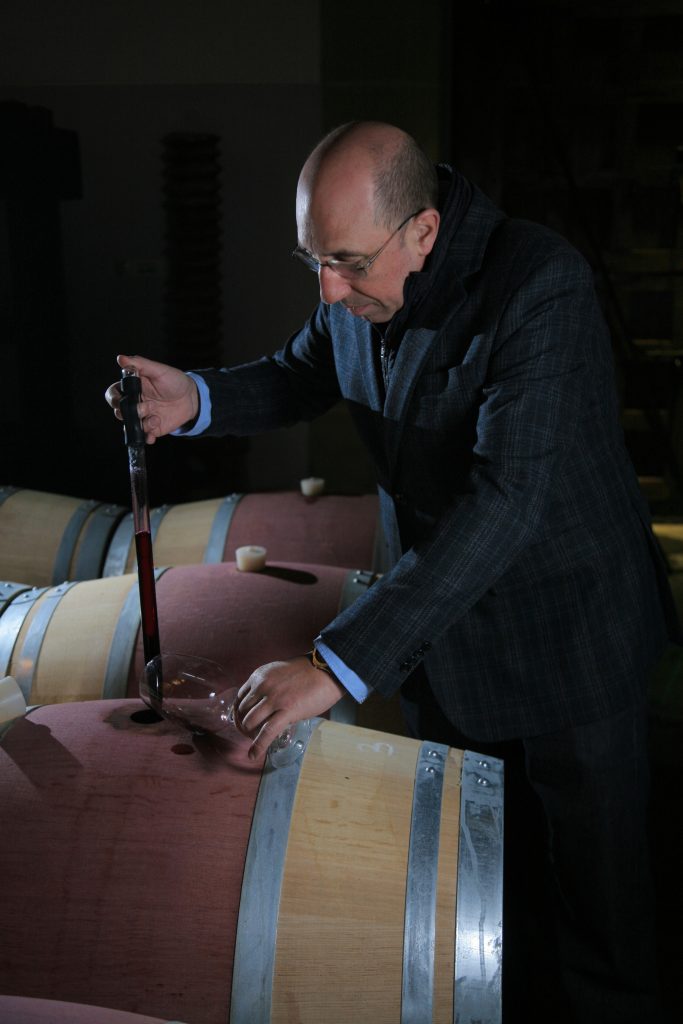
How important is the local and international market to you?
We are going through a transition. My grandfather and my father sold 100% of their wine in a rather local way. That is, in Rioja itself and the surrounding regions. My grandfather even at a more local level, almost in the surrounding villages and little else. When my brother and I started working, we realised that logically we had a great product, an exceptional vineyard that our ancestors, our great-grandfather, our grandfather, had left us. Our father made the vineyard and the quality vineyard grow in an important way, because it was not good. So we found ourselves with a very rich heritage, which we decided we had to make known to the world.
Not only have they expanded into the international market but they also have several wineries
We have different wineries, but always depending on the vineyard, which is the origin. Sierra Cantabria, where we make the most traditional wines, the village wines, and we maintain the tradition of our ancestors, of our vineyards, cultivated in our winery, and of a unique environment. It is not a blend of areas, it is a village wine. That is Sierra Cantabria, which is where we were born. Then there is Señorío de San Vicente, a winery with a clear philosophy: one vineyard, one winery, one wine. Then we have Viñedos de Páganos, which is an area of a little more altitude, more embedded in the foothills of the Sierra Cantabria. A little further east, 45 hectares of vineyards, in which we make three wines: El Puntido, La Nieta, and Calados del Puntido. These are plots of land with a very clear identity; it’s a vineyard that doesn’t have much topsoil and its soil is limestone sandstone, which will give the vine, the plant, that complexity and that semi-stress, and it will be a wine that is always less full-bodied, finer, but with that nerve, that acidity, that character, a little bit of red floral fruit. It is a wine with a deep-rooted minerality, in the sense of being rooted in its terroir, in its vineyard. La Nieta is a small vineyard that for me conveys some really unique emotions. Another of our wineries is Viñedo Sierra Cantabria. When we started making wines from the plots, we created a winery so that, from the different large plots, we could make each plot its own wine. There we make Finca El Bosque, Amancio, Sierra Cantabria Mágico, where we make all the plot wines. And then there is Toro, which helped us to understand and to understand that complexity we need for the great wine.
What can we expect from you in the future?
We are very dynamic. At any moment I would like to make some white wine, I don’t know. There are always projects. You can expect everything. But we always have to grow based on the vineyard. We would like projects in other areas, but when it comes to work, I have to see the life of the vineyard throughout the growing year to be able to understand how to treat that grape that year. All living beings have their virtues and defects. For me, the most important thing is to try to enhance the virtues and minimise the defects, depending on the climatic year and other factors. And to do that, I have to live with the vineyard all year round. So, it’s a complicated way to grow, but it’s very nice.

